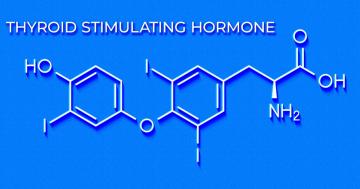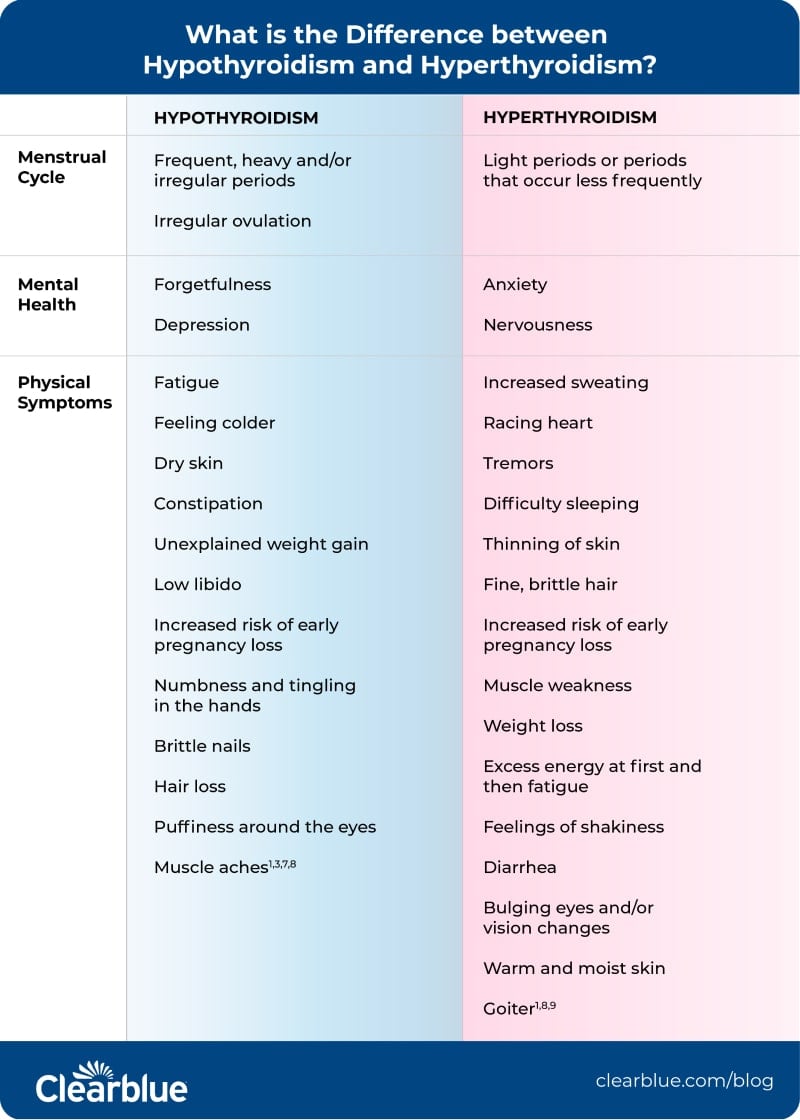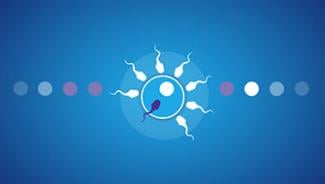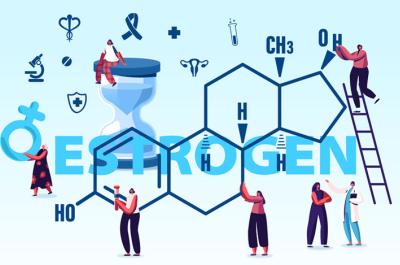What is TSH, the thyroid stimulating hormone?

While you likely know that your thyroid can affect many different parts of your body, you may not realize how it impacts your reproductive health. For example, did you know your thyroid can affect your menstrual cycles, which can lead to fertility issues?1 That’s why it’s important to understand what TSH is, why thyroid disease sometimes happens, and which symptoms may suggest your TSH levels need to be checked. Let’s dive in.
In this article
- What is TSH?
- What are normal TSH levels?
- Does your TSH level ever change?
- Can thyroid levels affect reproductive health?
- What causes high TSH levels?
- Should I be concerned about hypothyroidism and infertility?
- How can you lower TSH levels?
- What causes low TSH levels?
- Should I be concerned about hyperthyroidism and infertility?
- How do you increase TSH levels?
What is TSH?
TSH stands for thyroid stimulating hormone1 and is produced by the pea-sized pituitary gland, located at the base of your brain.1
To help you understand the role TSH plays in your reproductive health, here’s a quick anatomy lesson. The pituitary gland controls many glands that secrete hormones, including the thyroid gland.2 Your thyroid gland makes, stores and releases two important thyroid hormones, T4 (thyroxine) and T3 (triiodothyronine).1,3 TSH tells your thyroid gland to make T4 if needed.1,3 Your thyroid then produces T4, which is converted to T3.4 TSH levels and T4/T3 levels are closely tied: If T4 and T3 levels are too high or too low, this can impact your TSH levels.1
The thyroid hormones T4 and T3 control your metabolic rate, which is the speed at which your body converts food into energy.1 These hormones also affect your heart, muscle control and strength, digestion, weight, body temperature, bone maintenance and mood.1,2
According to the American Thyroid Association (ATA), during pregnancy, your baby depends on you for the production of the thyroid hormone during the first 18 to 20 weeks of pregnancy.5 After this time, your baby begins making their own thyroid hormone but continues to rely on you for iodine, which is essential for making the thyroid hormone.5 ATA recommends that women who are trying to conceive (TTC), pregnant or breastfeeding take a daily supplement containing 150 mcg of iodine.5 Iodine can also be found in fish, milk, cheese, yogurt, enriched or fortified cereal and bread, and iodized salt.6
What are normal TSH levels?
Your healthcare provider will determine if your TSH levels are normal based on several factors including your age.1 TSH levels fluctuate a bit during pregnancy, rising slightly in the second and third trimesters.1
Does your TSH level ever change?
Certain disorders can cause your thyroid gland to make too much or too little T4. (If you have any concerns that you may have any of these, reach out to your doctor.)3
- Hypothyroidism1: If you don’t have enough T4, your body functions begin to slow down.2,3 Your pituitary gland then begins to make larger amounts of TSH to prompt your thyroid to work harder.2
- Hyperthyroidism1: If you have too much T4, your body functions speed up.2,3 Your pituitary gland then makes little or no TSH.2
Symptoms of hypothyroidism and hyperthyroidism
Hypothyroidism and hyperthyroidism have many different symptoms that can affect your menstrual cycles and mental and physical health. This chart shows some of the differences between the two.

Can thyroid levels affect reproductive health?
High or low levels of thyroid hormone can cause changes in the menstrual cycle, including irregular periods, absent periods, or light or heavy periods.10 According to Johns Hopkins Medicine, an overactive or underactive thyroid can also affect ovulation.10
During pregnancy, not having enough thyroid hormone can cause early pregnancy loss and preterm delivery.10 Having too much of the thyroid hormone can result in more-severe morning sickness.10 Thyroid disorders have also been linked to the early onset of menopause.10
If you have any concerns regarding your thyroid levels, talk to your doctor.
What causes high TSH levels?
High TSH levels could mean you’re experiencing hypothyroidism, in which your thyroid isn’t making enough thyroid hormone.1 According to the American College of Obstetricians and Gynecologists, thyroiditis (inflammation of the thyroid gland) is the most common cause of hypothyroidism and, in turn, Hashimoto disease is the most common type of thyroiditis.3
Other causes of high TSH levels include autoimmune diseases, radiation treatment, surgical removal of part of the thyroid gland, congenital hypothyroidism, certain medications, damage to the pituitary gland and too much or too little iodine.3,7
Should I be concerned about hypothyroidism and infertility?
Many pregnant people with thyroid disease (including those with hypothyroidism) can have healthy babies.3,8 However, hypothyroidism can cause irregular periods and irregular ovulation, which can make TTC more difficult. The condition can also increase the risk of early pregnancy loss.8 Because untreated thyroid disease can cause problems for both mom and baby, it’s important to treat hypothyroidism while TTC and throughout pregnancy.3,8 If you suspect an issue with your thyroid, see your healthcare provider.
How can you lower TSH levels?
If your TSH levels need to decrease, it’s likely because your thyroid gland isn’t making enough thyroid hormone (hypothyroidism). Have a discussion with your healthcare provider to understand your options for addressing the issue.
What causes low TSH levels?
Low TSH levels could mean your thyroid is making too much thyroid hormone, which is called hyperthyroidism.1
Additionally, low TSH levels can also result from a problem with the immune system or a viral infection, both of which result in excess thyroid hormone but not as a result of an overactive thyroid.9
Should I be concerned about hyperthyroidism and infertility?
As with hypothyroidism, early pregnancy loss has been linked to hyperthyroidism.8 Hyperthyroidism also can cause irregular periods, which can affect your chances of getting pregnant.8 If you have any concerns about hyperthyroidism, reach out to your doctor, as she/he will be in the best position to advise you.
How do you increase TSH levels?
If your TSH levels need to increase, it’s likely because you are experiencing hyperthyroidism and your thyroid gland is making too much thyroid hormone. How you manage this is individual and will be determined by you and your healthcare provider.
Related Articles
- Cleveland Clinic. Thyroid-stimulating hormone (TSH) levels. Updated July 25, 2022. Accessed February 27, 2023. https://my.clevelandclinic.org/health/articles/23524-thyroid-stimulating-hormone-tsh-levels
- A.D.A.M. Medical Encyclopedia. TSH (Thyroid-stimulating hormone) test. Accessed February 27, 2023. https://medlineplus.gov/lab-tests/tsh-thyroid-stimulating-hormone-test/
- The American College of Obstetricians and Gynecologists. Thyroid disease. Updated January 2021. Accessed February 27, 2023. https://www.acog.org/womens-health/faqs/thyroid-disease
- American Thyroid Association. Thyroid function tests. Accessed February 27, 2023. https://www.thyroid.org/thyroid-function-tests/
- American Thyroid Association. Hypothyroidism in pregnancy. Accessed February 27, 2023. https://www.thyroid.org/hypothyroidism-in-pregnancy/
- March of Dimes. Vitamins and other nutrients during pregnancy. Updated September 2020. Accessed May 8, 2023. https://www.marchofdimes.org/find-support/topics/pregnancy/vitamins-and-other-nutrients-during-pregnancy
- American Thyroid Association. Hypothyroidism (underactive). Accessed February 27, 2023. https://www.thyroid.org/hypothyroidism/
- Endocrine Web. The connection between thyroid disorders and fertility. Updated August 4, 2020. Accessed March 10, 2023. https://www.endocrineweb.com/thyroid-disorders-fertility
- American Thyroid Association. Hyperthyroidism (overactive). Accessed February 27, 2023. https://www.thyroid.org/hyperthyroidism/
- Johns Hopkins Medicine. Thyroid disorders in women. Accessed February 27, 2023. https://www.hopkinsmedicine.org/health/conditions-and-diseases/thyroid-disorders-in-women

Get pregnant naturally
Ovulation tests are accurate and simple to use.




